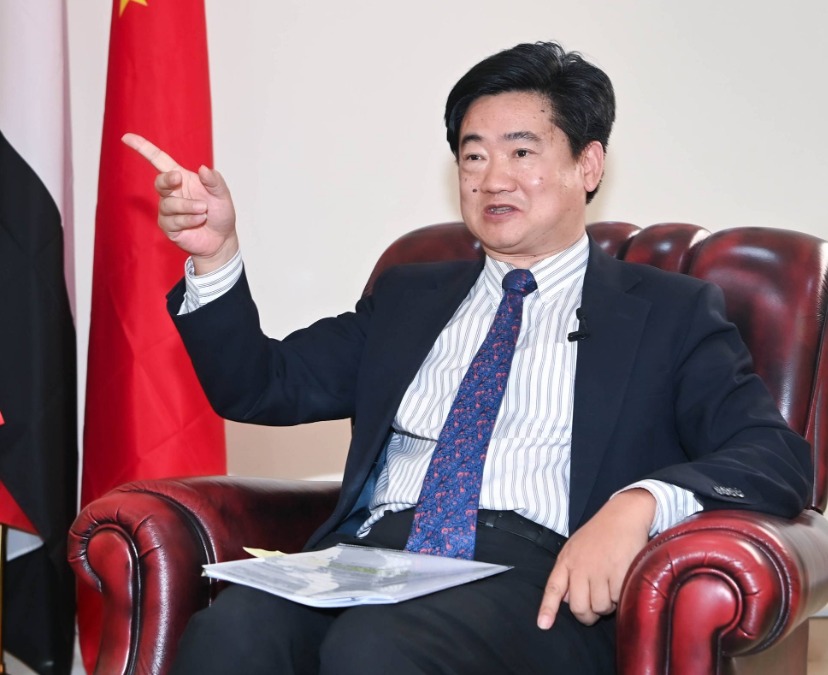


Barran Press
The chargé d'affaires of the Chinese Embassy in Yemen, Shao Zheng, revealed on Sunday that a delegation from the Yemeni Islah Party's visit to Beijing was in response to an invitation to attend an important conference in China.
In an interview with the Asharq Al-Awsat newspaper, Zheng disclosed that China maintains "intense communication" with the General People's Congress, the Socialist Party, and other Yemeni political parties. He expressed hope that Yemeni parties would work together to achieve peace in Yemen, benefiting the country and its people.
The Chinese diplomat spoke optimistically about the future of relations between his country and Yemen, stating that "the two sides have achieved fruitful cooperative results in all fields over the past years."
Zheng highlighted that this year marks the 68th anniversary of the establishment of diplomatic relations between China and Yemen. He emphasized that "in recent years, China and Yemen have achieved fruitful cooperative results in various fields, including politics and economics."
He asserted that "China and Yemen support each other on the regional and international arenas," adding that "we are confident that the future of Sino-Yemeni relations is bright, and we can enhance cooperation through the Belt and Road Initiative, global security, global development, and other Chinese initiatives."
Zheng acknowledged China's communication with the Houthi group, internationally designated as a terrorist organization and other Yemeni parties. He called for an end to the targeting of commercial vessels in the Red Sea.
Regarding events in the Red Sea, Zheng stated that China is prepared to coordinate with regional countries to achieve peace in the region swiftly. He clarified that the Chinese military base in Djibouti is not currently involved in any activities in the Red Sea.
Zheng mentioned that the Chinese navy, stationed in the Gulf of Aden and off the coast of Somalia, has protected 7,200 Chinese and foreign vessels in the region over the past 15 years, with the participation of 35,000 Chinese soldiers.
Addressing recent US sanctions on certain Chinese companies accused of supplying military materials to the Houthis, the Chinese official stated that his country rejects any sanctions against Chinese companies. He described the sanctions as "individual and unilateral, imposed without the approval of the Security Council."
Zheng touched upon his recent visit to Yemen, his third in a year, which included visits to Hadhramaut and Aden. He attended the arrival ceremony for Chinese medical aid, including over 1,000 medical supplies and 10 ambulances.
He added: "I witnessed significant progress in the local community, for example, internet speed is better than before. However, Yemen faces other challenges, such as electricity generation. During my time in Aden, I met with the Prime Minister and ministers in the legitimate government, and we engaged in extensive discussions about bilateral relations and the Yemeni situation. We support the legitimate government and the Presidential Leadership Council."
Zheng stated that "Sino-Yemeni cooperation in the past focused on traditional industries, but today it centers on new energy. Yemen possesses abundant solar energy resources, and many Yemeni families have solar panels made in China. As we know, Yemen faces a problem and shortage in electricity generation, and Chinese companies have the capacity in this field. With the improvement of the Yemeni situation and the establishment of peace, China and Yemen will begin cooperating in the field of new and clean energy and other areas."
The Chinese diplomat emphasized that Beijing is communicating and coordinating with all regional powers, including Saudi Arabia, whose role he described as "positive" in achieving peace in Yemen.
He added: "Regarding the Yemeni issue, we are constantly communicating with regional countries. The Saudi ambassador to Yemen, Mohammed Al Jaber, is a dear friend, and we have met repeatedly. We support the positive efforts to achieve peace in Yemen by Saudi Arabia and regional countries, and we look forward to achieving peace in the near future, benefiting the region and the world."
Zheng confirmed China's unwavering support for the legitimate government and the Presidential Leadership Council. He added: "We support the peace roadmap in Yemen, and I hope that the concerned parties will sit at the table to reach a peaceful agreement soon. We also support the efforts of the UN Special Envoy, and we hope that other parties will support his efforts as well. We call for a Yemeni-led peace process in Yemen, and we urge the concerned parties to exercise restraint and avoid escalating the situation in Yemen."
He pointed out that Beijing is working in coordination with the UN Special Envoy, the five permanent members of the Security Council, and other relevant parties to push for a peaceful process in Yemen.
Regarding communication with the Houthis and other parties, the chargé d'affaires indicated that this is "to understand their true intentions and make joint efforts to achieve peace in Yemen."
In this context, he called on the Houthis to "stop targeting commercial vessels in the Red Sea." He continued: "We call on the concerned parties to sit at the table and reach a peaceful agreement soon, which is in line with the interests of the Yemeni people in general."
Commenting on the Houthis' targeting of a Chinese ship in the past, Zheng confirmed that China is closely monitoring the situation in the Red Sea. He stated: "As you know, the foreign shipping market is relatively complex, and we cannot distinguish which ship belongs to which country. Therefore, we call for an end to the military targeting of commercial vessels to avoid affecting global production and supply chains."
He stated that "the international community must ensure peace in the Red Sea in accordance with international law. We cannot target civilians for any reason. On the other hand, we must achieve peace in Gaza and avoid the spread of civilian targeting around the world, and we must respect the sovereignty of the countries bordering the Red Sea, such as Yemen. We also call on and warn commercial vessels to raise their security awareness."